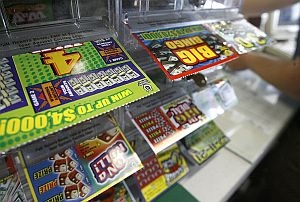 (Host) The recession has hurt one source of state revenues that some thought were immune to tough economic times.
(Host) The recession has hurt one source of state revenues that some thought were immune to tough economic times.
Proceeds from the Vermont lottery are down about 10 percent. Instead of gambling to win big, people are apparently choosing to spend less on the games of chance.
VPR’s John Dillon reports:
(Sounds from ticket sales in a convenience store)
(Clerk) "There you are, have a great day."
(Dillon) At a convenience store in downtown Montpelier, the orange lottery machine is not yielding any winners.
And the state-run lottery isn’t either. It’s bringing in less money for the Vermont Education Fund. Revenues are down about 10.5 percent so far this year.
Alan Yandow is executive director of the Vermont lottery. He said a survey in October found that 42 percent of customers said they were cutting back on buying impulse items, like lottery tickets.
(Yandow) “That was when the gas prices were high. But I think even though gas prices have declined, that certainly we’re seeing layoffs, and we’re seeing concerns about the future as far as economics go. So the people are spending less.”
(Dillon) Last year, profits from the ticket sales contributed about $23 million to the state education fund. About $66 million – or about 63 percent of sales – went to prizes for the players. The rest of the revenue – roughly 14 percent — covered commissions and operating expenses.
Yandow says the Vermont lottery hopes to boost sales with new and different games. One called Hot Lotto will be introduced in July. It’s similar to the current Powerball game.
(Yandow) “And we’re also refreshing the Megabucks game, which will take place about the same time. So we’re trying to make changes to really counter the decline in revenue.”
(Dillon) Vermont is not alone in seeing a drop in ticket sales. California’s lottery revenue is down about 10 percent, while sales are off about 4 percent in Texas.
Some experts had assumed that the lottery business would grow during a recession as people gambled on striking it rich. But Yandow says that appears not to be the case.
(Yandow) “They’re not spending as much on impulse items, like lottery tickets. So I don’t think it was necessarily directly a `let’s not buy lottery and continue to buy everything else.’ But I think it was an indication that impulse items were not at the top of their list at that particular point in time.”
(Dillon) The odds of winning the Megabucks jackpot are about one in 5.2 million, according to the state lottery Web site. The Powerball odds are about one in 146 million.
(Convenience store sounds)
The long odds and the economic recession didn’t deter this customer in Montpelier, who preferred not to give her name.
(Customer) “It hasn’t had any effect on me at all. I buy them sporadically if I happen to think of it. And I always have. It hasn’t changed my pattern at all. I’m actually not a very big gambler but I figure if any of the money actually gets to education, it’s just like doing a small donation along the way. That’s why I do it. I really don’t expect to win.”
(Dillon) Last year, the Douglas administration hoped to increase revenues by leasing the lottery to a private operator. The Legislature rejected the plan, and the investment company that proposed the lease has since filed for bankruptcy.
For VPR News, I’m John Dillon in Montpelier.
AP Photo: Toby Talbot